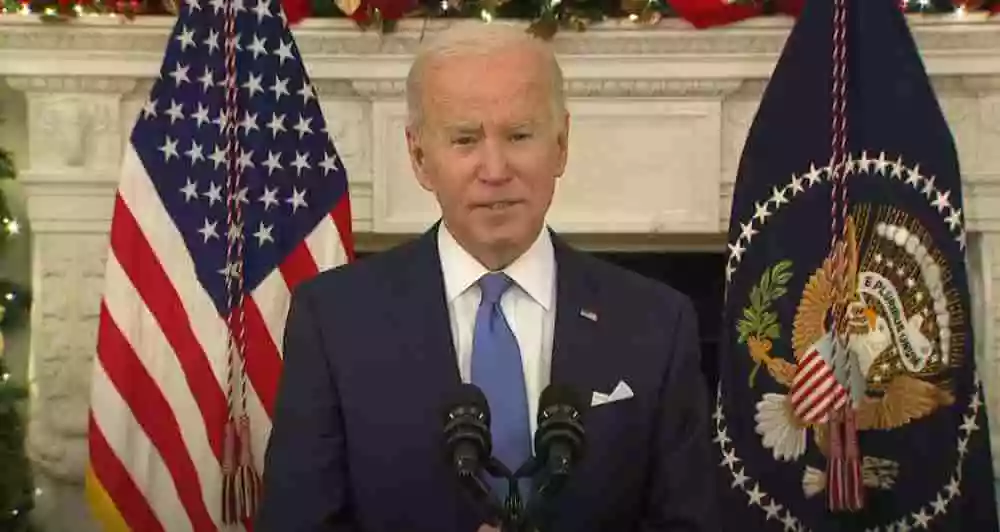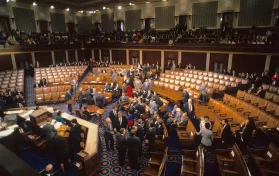
On Tuesday, President Biden took a break from his vacation in the Carolinas to head into DC and sign the Inflation Reduction Act into law. The bill is a scaled-down version of the Build Back Better bill that Senator Joe Manchin (D-WV) and Senator Kyrsten Sinema (D-AZ) said unequivocally that they would not support in 2021. In July, Manchin’s office announced that he would support this new version of the legislation, newly named the Inflation Reduction Act.
Slightly later – and after much debate – Senator Sinema announced that, with a few tweaks to the bill, she would also support the IRA. After a wild vote-a-rama earlier this month, the bill passed on reconciliation in the Senate, and last Friday, the bill passed in the House of Representatives by a vote of 220 – 207.
The sweeping spending legislation includes funding for the IRS, investments in green energy, and health care costs.
President Joe Biden spoke before he signed the bill, calling the legislation historic. House Democratic Whip Jim Clyburn (D-SC) joined Biden onstage, and Clyburn said, “(Today is) one of the few truly historic days in the thirty years I have spent in the Congress.”
Biden thanked Clyburn for supporting him, saying that he (Biden) would not be present as the nation’s president without Clyburn’s support.
Biden echoed some comments made by Senate Majority Leader Chuck Schumer (D-NY), touting the recent legislation that Democrats have somehow managed to get through the chamber even with a 50-50 split in the Senate. Vice President Kamala Harris came to the Senate twice on Saturday, August 6, to cast votes that broke the 50-50 tie in the chamber.
Joe Manchin was in the front row of the room where the signing took place. Senator Schumer noted Manchin’s support in getting the bill passed, and there was a round of thunderous applause from those in attendance.
The Inflation Reduction Act authorizes $369 billion for green energy projects that will reduce carbon emissions by up to forty percent by the end of the decade. This goal is the most ambitious in fighting climate change, and the investment in green energy in the Inflation Reduction Act is the “most significant” to date.
The Inflation Reduction Act will set a cap of $2,000 per year for out-of-pocket prescription drug expenses for those with Medicare, and it renews the Affordable Care Act subsidies for those lower-income individuals receiving their health insurance via the Marketplace.
Medicare providers will now be able to negotiate prices with drug companies in an effort to save seniors money. However, some of the changes in the way prescription drugs are priced does not take effect until 2025 or 2026. At any rate, it will be nearly three years before seniors will see adjustments to their prescription drug costs.
The cost of insulin – for those on Medicare Part D – will be capped at $35 in 2023.
One of the most contentious parts of the bill has to do with new taxes. While many Americans believe corporations should pay “their fair share” when it comes to taxes, the original intent of the bill changed when Senator Sinema asked that, in exchange for her support, the bill would not target certain tax provisions.
On Thursday, August 3, Sinema’s office released a statement: “We have agreed to remove the carried interest tax provision, protect advanced manufacturing, and boost our clean energy economy in the Senate’s budget reconciliation legislation. Subject to the Parliamentarian’s review, I’ll move forward.”
The Inflation Reduction Act sets a fifteen percent corporate minimum tax for many major businesses, and it offers $80 billion to the IRS.
The president is set to go on a nationwide tour to tout the benefits of the bill, starting with an event on September 6.
Biden said prior to signing the bill: “This historic bill will lower the cost of energy, prescription, drugs, and other health care for American families.” Biden added that the bill will help combat climate change and reduce the American government deficit.





